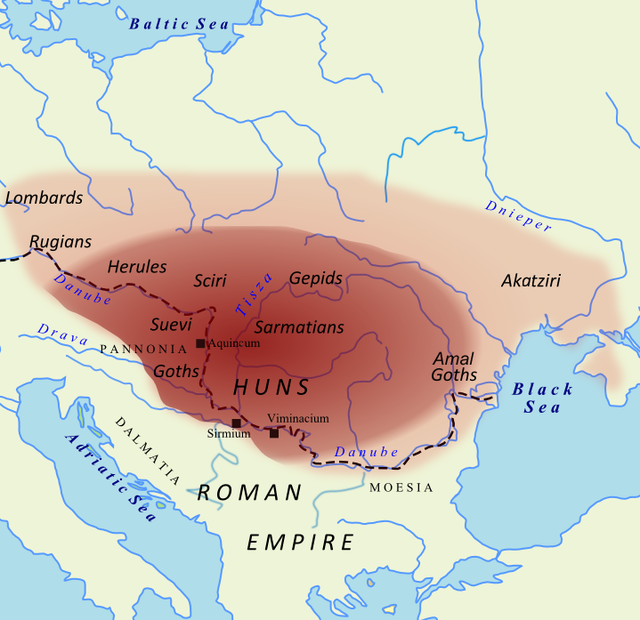Akatziri
Historical ethnical group From Wikipedia, the free encyclopedia
Historical ethnical group From Wikipedia, the free encyclopedia
The Akatziri, Akatzirs or Acatiri (Greek: Άκατίροι, Άκατζίροι, Akatiroi, Akatziroi;[1] Latin: Acatziri) were a tribe that lived north of the Black Sea, though the Crimean city of Cherson seemed to be under their control in the sixth century.[2][3] Jordanes (fl. 551) called them a mighty people, not agriculturalists but cattle-breeders and hunters.[4] Their ethnicity is undetermined: the 5th-century historian Priscus describes them as ethnic (ethnos) Scythians, but they are also referred to as Huns (Akatiri Hunni[1]). Their name has also been connected to the Agathyrsi.[1][4] However, according to E. A. Thompson, any conjectured connection between the Agathyrsi and the Akatziri should be rejected outright.[5]

Roman emperor Theodosius II (r. 402–450) sent an envoy to the Akatziri trying to detach them from their alliance with the Hunnic ruler Attila (435–453),[6] an effort made to stir up fighting which also ensued.[7] In 447 or 448 the Huns successfully campaigned against the Akatziri.[8] In 448 or 449, as Priscus recounts "Onegesius along with the eldest of Attila's children, had been sent to the Akateri, a Scythian people, whom he was bringing into an alliance with Attila".[9] As the Akatziri tribes and clans were ruled by different leaders, emperor Theodosius II tried with gifts to spread animosity among them, but the gifts were not delivered according to rank, Karadach (Kouridachos), warned and called Attila against fellow leaders.[10] So Attila did, Kardach stayed with his tribe or clan in own territory, while the rest of the Akatziri became subjected to Attila.[10] Attila's son Ellac was installed as ruler of the Akatziri.[8] According to Sinor (1990), they were absorbed by the Saragurs in the 460s.[4][clarification needed].
Akatziri were also hypothesized to be a Turkic tribe, their ethnonym connected to Turkic ağaç eri, 'woodman'[4] or *Aq Qazir "White Khazars".[15] However, Peter B. Golden further remarked that: " Neither of these theses has been firmly grounded in anything beyond phonetic resemblance";[16] and the other hypothesis that Akatziri were ancestors of the Khazars is not backed up by any solid evidence.[17] Omeljan Pritsak links Ak-Katzirs (< Άκατζίροι) to the name Khazar, though he explains that the polity was named Khazar simply because the Ashina-ruled Western Turks, after losing their territories to Tang Chinese, took over the territory formerly occupied by the Akatziri.[18]
Seamless Wikipedia browsing. On steroids.
Every time you click a link to Wikipedia, Wiktionary or Wikiquote in your browser's search results, it will show the modern Wikiwand interface.
Wikiwand extension is a five stars, simple, with minimum permission required to keep your browsing private, safe and transparent.